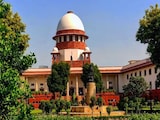Chief Justice of India (CJI) N V Ramana today said that the Constitution provides separation of power among the three organs of the state, and one should be mindful of the 'Lakshman Rekha' while discharging their duty.
"Constitution provides separation of power among three organs and the harmonious function between three organs strengthens democracy. While discharging our duty, we should be mindful of Lakshman Rekha," said the Chief Justice.
The Chief Justice also made it clear that his remarks about legislative scrutiny during the last Independence Day were misconstrued, and he did not want to interfere in the legislative sphere. But using Lok sabha Speaker's remark reiterated the need for proper legislative scrutiny before passing laws.
He was speaking at the Joint Conference of Chief Ministers and Chief Justices of High Courts, which was inaugurated by Prime Minister Narendra Modi this morning.
Mr Ramana also voiced his concern over the misuse of Public Interest Litigations (PIL).
PILs have now turned into "Personal Interest Litigation" and are used to settle personal scores, he said, adding that courts are now highly cautious in entertaining the same.
The Chief Justice said that deliberate inaction by governments despite judicial pronouncements is not good for the health of democracy.
Amid a debate over Hindi and the linguistic diversity in the country, the Chief Justice of India said that the time has come for the legal system to introduce local languages in courts.
Speaking at the event, Prime Minister Narendra Modi also underlined the need to introduce local languages in the courts.
"We need to encourage local languages in courts. This will not only increase the confidence of common citizens in the justice system but they will feel more connected to it," PM Modi said.
The Prime Minister urged the Chief Ministers to repeal outdated laws to make the delivery of justice easier.
"In 2015, we identified about 1,800 laws which had become irrelevant. Out of these, 1,450 such laws of the Centre were abolished. But, only 75 such laws have been abolished by the states," he said.
PM Modi also stressed the need for a digital judicial system that can empower citizens.
"To strengthen citizens, technology has become an important tool. Likewise, our judicial infrastructure needs to be digitalised too. Tech-friendly human resources play an important role in integrating Digital India with the nation's growth story," the Prime Minister added.















